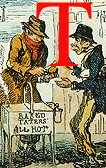[Many modern people mistakenly imagine the Victorian period to have been a time of tranquility and peace, far different from our own supposedly more violent age. In fact, parts of London were so dangerous no policeman would enter them, and thieves would murder people for their handkerchiefs. According to the guide to London published by Charles Dickens's son in 1888, even the Victorian household, that secure haven, was beset by vicious thieves, hustlers, and con artists. The section entitled "Householders, Hints to" warns:]
 oo much caution cannot be exercised in regard to the admission of strangers, especially during the absence from home of the master of the house. Every kind of thief is on the watch for a favourable moment to gain admission, and after having induced the servant to leave unprotected the hall or room, into which he contrives to be shown, to lay hands on all the available portable property. A more dangerous class of intruder still is he who comes provided with the card of a friend or acquaintance of the family, and offers for sale lace or other light goods. This is sure to be a fraud of a most dangerous kind. The card which procures the introduction to the house has been stolen, and the object of the visit is invariably plunder.
oo much caution cannot be exercised in regard to the admission of strangers, especially during the absence from home of the master of the house. Every kind of thief is on the watch for a favourable moment to gain admission, and after having induced the servant to leave unprotected the hall or room, into which he contrives to be shown, to lay hands on all the available portable property. A more dangerous class of intruder still is he who comes provided with the card of a friend or acquaintance of the family, and offers for sale lace or other light goods. This is sure to be a fraud of a most dangerous kind. The card which procures the introduction to the house has been stolen, and the object of the visit is invariably plunder.
Equally annoying, though perhaps not so ultimately dangerous, is the sham railway porter or messenger. This variety of the predatory race is in the habit of watching the master or mistress clear from the house, and then calls with a bogus parcel, for the carriage of which, and sornetimes for the parcel itself, he, demands such sums of money as lie thinks most likely to be paid without question. In no case should a parcel be taken in under these circumstances. Another well-known parcel dodge is to watch the delverey by some draper's cart of a parcel, and ten minutes afterwards to call and redemand it, on the plea of some mistake having occurred in the delivery.
Great care should be take in in the matter of fastenings to doors and windows. Nothing is easier or more common than for a thief to make his entrance into a house by way of the upper windows, or by, climbing the portico at a time when the household, is engaged at dinner, or when the general attention is otherwise averted.
If the pattern of your mud scraper pleases you, or you attach any importance to its possession, it is not well not to leave it unsecured out of doors after dusk. It may be taken as a general rule that burglary or thieving on a large scale is never attempted unless the practitioner knows perfectly well that the house contains booty worthy of the risk necesssarily involved. It is, therefore, to say the least of it, injudicious to allow servants to make an ostentatious display of plate at area or kitchen windows.
Every householder should be careful to make himself acquainted with the nearest "fixed point"' at which a constable may always be found, the nearest police-station, and the nearest stations of the fire brigade. [Dickens's Dictionary, p. 131; paragraph divisions not in the original (GPL).]
Related Material
Bibliography
Dickens, Charles. Dickens's Dictionary of London 1888. Moretonhampstead, Devon: Old House Books, 2001. [Information on this reprint of the guide to London written by the novelist's son.]
Last modified 8 November 2012